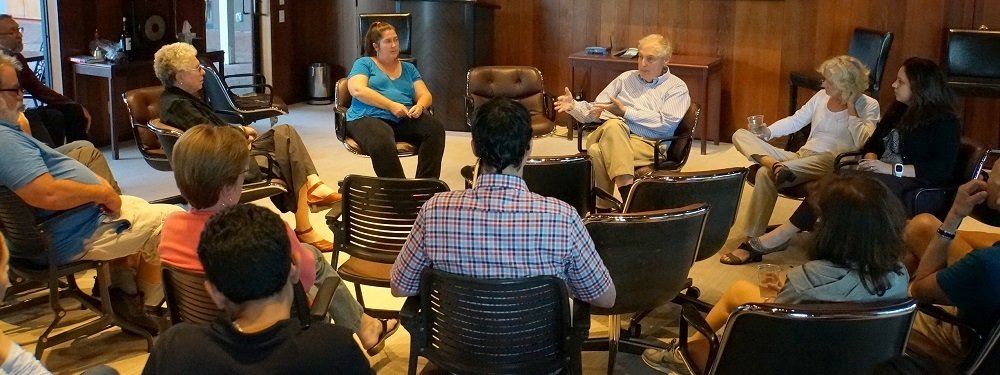CASBS Hosts Screening and Discussion of the Forthcoming Film EXPERIMENTER
On October 6 CASBS fellows, colleagues from Stanford’s psychology and political science departments, and other guests were treated to a screening of the film EXPERIMENTER, a dramatization of the early 1960s psychology experiments conducted by Stanley Milgram at Yale University on the social aspects of obedience to authority.
In the most infamous of those experiments, a participant “teacher” in one room was instructed by an “experimenter” to administer increasingly painful levels of electric shocks to a peer “learner” in an adjacent room whenever the learner registered incorrect responses to memory-based questions. The learner was a confederate pretending to be a volunteer, and the shocks were not real. Though questioned and debated to this day, Milgram’s experiments measured the willingness of study participants to obey an authority figure who instructed them to perform acts conflicting with their personal conscience.
Following the film CASBS fellow Rose McDermott and Stanford psychology professor Lee Ross led a lively, stimulating discussion that elaborated on the finer points of Milgram’s studies, his enduring impact on the profession, and the dramatization’s notable accuracies and inaccuracies.

Widely known as a towering figure in contemporary social psychology, Ross was particularly well-suited to serve as a discussant, as much of his career findings have offered valuable insights into the factors that influence personal judgment and decision-making processes. More importantly, having earned his PhD at Columbia University in 1969, Ross is intimately familiar with the work of the social psychology titans of that period—Milgram, Solomon Asch, and Stanford Professor Emeritus Philip Zombardo. Ross knew Milgram and worked closely with Zimbardo—himself a CASBS fellow in 1971–72— during Zimbardo’s visiting year at Columbia, and he lunched once a week with Solomon Asch at CASBS when Asch was a CASBS fellow in 1976–77.
“Lee has always been one of the smartest and most interesting psychologists to comment on Milgram’s work,” said Rose McDermott. “His own work and insights on the power of the situation have provided a much deeper understanding of the situational details and pressures driving the outcomes witnessed in the Milgram study. In particular, Ross highlights how difficult it can be for people to leave situations that do not have obvious opportunities for exit, and how this seemingly simple opening might reduce conformity rates significantly.”
McDermott herself was an excellent choice to join Ross as discussant tandem, having earned her PhD at Stanford under Zimbardo.
“Zimbardo and Milgram attended the same high school—Monroe, in the Bronx—before Zimbardo went off to Brooklyn College and Milgram attended Queens College. In their high school class, Zimbardo was voted most popular, while Milgram was voted most likely to succeed. While Milgram may never have been exactly popular, they both became famous creating iconic and influential experiments in the history of social psychology.”
